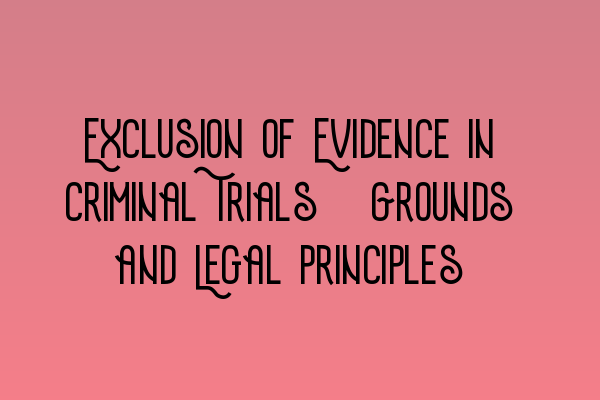Exclusion of Evidence in Criminal Trials: Grounds and Legal Principles
Welcome to our blog post on the exclusion of evidence in criminal trials. As criminal law practitioners at SQE Criminal Law & Practice Law UK, we understand the significance of evidentiary rules and their impact on the outcome of a case. In this article, we will explore the grounds and legal principles surrounding the exclusion of evidence, ensuring you have a comprehensive understanding of this crucial aspect of criminal proceedings.
The Purpose of Exclusionary Rules
Exclusionary rules exist to prevent the admission of evidence that has been obtained unlawfully or unfairly. These rules aim to maintain the integrity of the criminal justice system and protect individuals’ rights to a fair trial. It is essential to understand that the exclusion of evidence is not a punishment for the prosecution, but rather a safeguard for the accused.
Grounds for Exclusion
There are several grounds on which evidence may be excluded from criminal trials:
- Illegally Obtained Evidence: Evidence that has been unlawfully obtained, such as through a search conducted without proper authorization, may be excluded. The exclusionary rule serves as a deterrent against police misconduct and upholds the principle that the ends do not justify the means.
- Breach of Legal Privilege: If privileged communication between a client and their solicitor is improperly disclosed, the evidence derived from this breach may be excluded. Protecting the confidentiality of legal advice is crucial for maintaining the attorney-client privilege.
- Unreliable or Prejudicial Evidence: Evidence that is unreliable, misleading, or unduly prejudicial may be excluded to prevent the possibility of an unfair trial. The court must weigh the probative value of the evidence against its potential to unfairly influence the jury.
- Breach of Human Rights: Evidence obtained in violation of a defendant’s human rights, such as through coerced confessions or torture, is inadmissible in a criminal trial. This ensures that the criminal justice system respects and upholds fundamental human rights.
- Improper Identification Procedures: If the procedures used to identify a suspect are flawed or suggestive, resulting in a significant risk of misidentification, the identification evidence may be excluded. This ensures the fairness and reliability of identification evidence.
Legal Principles
When determining whether evidence should be excluded, the court considers various legal principles:
- The Balancing Test: The court must balance the interests of justice and the need for a fair trial against the impact of admitting the evidence. This principle ensures the integrity of the criminal justice system is upheld while achieving a just outcome.
- The Exclusionary Discretion: The court has discretionary powers to exclude evidence when its admission would bring the administration of justice into disrepute. This allows the court to prevent the use of evidence that would undermine public confidence in the legal system.
- The Fruit of the Poisonous Tree: This principle stipulates that evidence derived from unlawfully obtained evidence is also inadmissible. In other words, if the primary evidence is tainted, any secondary evidence derived from it is likewise excluded.
- The Proportionality Principle: The court must consider whether the exclusion of evidence is proportionate to the breach that occurred. This principle aims to strike a balance between protecting individual rights and ensuring the proper administration of justice.
Conclusion
Understanding the grounds and legal principles for the exclusion of evidence in criminal trials is essential for both prosecutors and defense counsel. Adhering to these rules ensures that the criminal justice system remains fair, just, and respects the rights of all individuals involved. If you are preparing for your SQE exam or seeking additional resources on criminal law and practice, we recommend checking out our related articles:
- SQE 1 Practice Exam Questions
- SQE 1 Practice Mocks FLK1 FLK2
- SQE 2 Preparation Courses
- SQE 1 Preparation Courses
- SRA SQE Exam Dates
For more information and expert guidance on criminal law and practice, please don’t hesitate to contact us at SQE Criminal Law & Practice Law UK. Our team of experienced professionals is here to assist you every step of the way.
